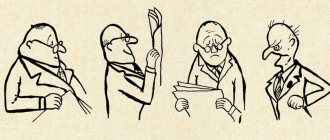Character accentuation is a term that was introduced into psychological science by Karl Leonhard. Lichko's classification was created somewhat later and in many ways it is similar to that of the discoverer.
Both specialists considered accentuation to be a deformation of character, in which some of its features stand out. In modern psychological practice, this position has been somewhat revised. Accentuation is considered a variant of the clinical norm, a feature of the character of a particular person.
In Lichko’s classification there are 11 character accentuations. Each of them has its own characteristics.
Accentuations can be expressed to varying degrees. In the mildest version, we are talking about minor features. Most often there is some kind of golden mean. It is also possible to have a high severity at the level of the borderline of the norm or full-fledged psychopathy or, as they say now, a personality disorder. Psychopathy can also be considered a variant of accentuation, but pathological, overly expressed and dictating the patient’s lifestyle.
What do you need to know about character accentuations according to Lichko’s classification?
Hyperthymic
It is considered perhaps the most dynamic character accentuation in terms of the intensity of the nervous system. People with hyperthymia are sociable and have increased sociability. These are typical extroverts who can find a common language with almost anyone and easily make friends.
Characterized by a group of features:
- Elevated mood. Constantly elevated background. Which generally explains the name of this character accentuation. The emotional component is characterized by high stability. It is difficult to upset such accentuators.
- Sociability. Increased tendency to communicate. In difficult cases, when hyperthymia is pronounced, sociability reaches the point of intrusiveness and even talkativeness. Patients are encouraged to work with this aspect of their personality. Because they can be an obstacle to establishing personal relationships and/or professional growth and development.
- Frivolity reaching the point of absurdity. In the mildest cases there is a minimal problem. When expressed, it carries danger. For example, such a patient is quite capable of wasting his salary on gambling and does not see anything wrong with this.
- Inability to complete a task. A quick change of interests, as an integral part of that same frivolity.
- Communication skills. The ability to make friends and partners. A useful trait for people involved in entrepreneurship and business. Therefore, representatives of this class can be found among professional “dealers”.
- Intolerance of monotony and monotony. What determines professional preferences. For example, such people practically do not engage in scientific activities, since it requires constant concentration. However, they feel great in places where they constantly need to work with others and communicate. For example, in the role of a manager, etc.
- Propensity to take increased risks. Including a passion for gambling, a tendency to risk your life. For example, the latter can manifest itself in extreme sports.
Positivity and sociability are clearly positive traits of hyperthymia. As for the disadvantages of hyperthymia, it is frivolity, a tendency to take unjustified risks. In the middle “position”, if the accentuation is slightly expressed, the negative features are smoothed out.
Degree of severity of accentuations
Trying to give a more precise definition of what character accentuation is, Andrei Lichko identified two groups (or two stages) of accentuations:
- Hidden accentuation. In this case, specific character traits are practically not noticeable, but can manifest themselves in stressful situations and conflicts.
- Explicit accentuation. All specific and problematic character traits are expressed quite strongly and manifest themselves in many life situations. Explicit accentuation is considered an extreme case of the norm.
Accentuation of character is the sum of hereditary characteristics of the psyche, upbringing and accumulated life experience. Usually, the hereditary component under normal conditions of upbringing forms only a hidden form of accentuation, and under the influence of various external factors it can become explicit.
Hysterical
The hysterical type is one of the most difficult in terms of communication with him. Patients themselves do not experience communication problems, but negative traits can seriously complicate the building of close relationships, for example, friendships or romantic ones. Among the features of this class:
Egocentrism. Patients with hysterical accentuation of character are overly selfish. Basically, this becomes an obstacle to normal relationships. As part of psychopathy, such individuals view others only as tools for their own development and benefit.
The desire to be constantly in the spotlight. Increased artistry. At best, such patients choose creative professions, where they sublimate the increased concentration of psychic energy. They transfer it, as they say, into action. On the other hand, much more often the trait takes on a destructive character. For example, attempts at demonstrative suicide are typical. This trait does not contribute to good relations with others.
Inability to take into account other people's interests. Doesn't always happen. Closer to the level of psychopathy. Accompanied by a reluctance and inability to consider other people as equals. And at the same time, a feeling of superiority and arrogance is added.
Active position. A positive trait. Hysteroids often get into trouble and try to be the center of attention. They make excellent civil activists, politicians, lawyers and other people who are involved in socially important matters.
Communication skills. They know how to establish relationships with almost anyone. This is also a merit of artistry, since partners simply do not see negative traits. Hysteroids know how to hide their true face, at least until they get close enough to others.
Persistence to the point of stubbornness. Reluctance to accept another opinion. It is extremely difficult to convince a hysteroid.
Inability to survive “blows of fate.” Despite their apparent impenetrability, these people are not quite what they seem. They are afraid of being ridiculed and misunderstood. In the case of psychopathy, they are especially worried if something does not happen according to their plan.
Intolerance of criticism. Excessive sensitivity.
Increased initiative.
Hysteroids are extremely difficult in terms of communication and close relationships. But thanks to their persistence and initiative, they are indispensable in social work. They have an active creativity. They often choose appropriate professions.
Classification of accentuations according to Lichko
Soviet psychiatrist Andrei Lichko had a slightly different understanding of what character accentuation was. He attributed it only to character, because he believed that personality was too complex a concept for that. In 1977, he published his classification, which differs significantly from that proposed by Leonhard. It includes the following types:
- Hyperthymic. Those with this accentuation are usually active and optimistic, love to communicate, and are constantly in search of new hobbies. Their interests often change, so they tend to leave things unfinished.
- Cycloid. For such people, their mood changes over a wide range. At first they behave as if they have a hyperthymic type of accentuation, but then they plunge into a state of dysphoria. Typically, such phases last 1-2 weeks, sometimes there are long breaks.
- Labile. Such people are characterized by frequent mood swings. They are very sensitive, attached to loved ones, kind, sympathetic and altruistic.
- Sensitive. Owners of this type of accentuation are usually very self-critical, which is why they often suffer from an excess of complexes and low self-esteem. As teenagers, they are often bullied, but still remain kind.
- Astheno-neurotic. Such people are usually irritable and prone to hypochondria. Any difficulties cause them excessive stress, so they have a very hard time enduring exams, tests and competitions. At the same time, they are quite disciplined, neat and pedantic.
- Schizoid. People with this type of accentuation are not particularly sociable and spend a lot of time alone. They are closed in on their own emotions, so they are not prone to empathy. At the same time, they are distinguished by devotion and greatly value those few people with whom they become close.
- Psychasthenic. Owners of this type of accentuation usually hesitate for a long time before making decisions and avoid responsibility. They are prone to reflection; they think for a long time about their actions and statements, which seem to them erroneous or unnecessarily awkward.
- Epileptoid. These people are characterized by impulsiveness and increased excitability. They often make premature conclusions; at the slightest suspicion, they can allow an outburst of anger and attack a person with reproaches. They are very demanding not only of others, but also of themselves, therefore they are usually neat, responsible and punctual.
- Hysterical. Owners of this type of accentuation are characterized by egocentrism; they love to be in the center of attention, but at the same time they are constantly afraid of exposure. They are very proactive and quite persistent, but they easily change their hobbies.
- Conformal. Such a person usually strives to match his surroundings as much as possible and attaches great importance to the opinions of people who are authoritative for him. Conformity manifests itself in all areas of his life. Even his tastes, hobbies and sexual preferences are completely subject to the norms accepted in his environment.
- Unstable. Such people are usually quite lazy. They don't set goals or make plans. They like to relax and have fun, they often change interests and hobbies.
Astheno-neurotic
One of the weakest types of character accentuation according to Lichko. Accompanied by increased weakness and fatigue. Especially in activities associated with a competitive component. Characterized by a group of positive and negative traits:
- Fatigue, weakness. Especially when working for a long time. Accentants with a weak type of nervous system need constant breaks. They work at their own pace that suits them. These are melancholics, if we speak in the language of temperaments.
- Irritability. Especially if they are touched during the activity. There is no point in disturbing such patients. They don't switch well from one to the other. Prone to depression and bouts of melancholy.
- Hypochondriacity. Astheno-neurotics often look for symptoms of diseases in themselves. Often fatal. They are regular guests of hospitals and clinics.
- Inability to switch from one task to another quickly enough.
- Accuracy.
- Discipline. Willingness to obey authorities. At the same time, often astheno-neurotics do not recognize others and do not respect them just like that. For example, based on the principle of status. The respect of such a person must be earned.
- The ability to engage in monotonous work and other activities that are not related to the requirements of “competition.” Such accentuators work without problems with large amounts of information. They make excellent scientists, especially when combined with schizoid character accentuation. The main thing is not to rush such a patient. An astheno-neurotic person cannot tolerate pressure.
Astheno-neurotic accentuation of character is quite difficult in terms of tolerance. However, such people are distinguished by increased efficiency, high intelligence, and individualism. Therefore, they achieve results in scientific activities without any problems.
Diagnosis of character accentuations
Having found out what type of accentuation is inherent in a person, you can understand what problems and difficulties he experiences during social adaptation, what drives and motivates him, and also predict his reactions and behavior in current life situations.
To diagnose accentuation, the following methods are often used:
- Schmishek test;
- PDO Lichko;
- Leonard's technique.
A correctly chosen technique will allow you to obtain the most approximate results.
Philanthropist - helping for profit or a character trait?
Unstable
Severe accentuation in terms of correction. The unstable type is characterized by a tendency towards idleness, laziness and other negative manifestations. Like all other accentuations, it is partly socially conditioned. Therefore, it is possible to correct personality and character violations. There are several features:
- Laziness. Reluctance to do anything. The desire to constantly rest. This is not associated with fatigue and low energy reserves, as in astheno-neurotics. Rather, we are talking about problems with character, a conscious desire to lead such a lifestyle. The disorder is noticeable even in childhood. By adolescence, everything becomes even more obvious.
- Tendency to spend idle time. Sex, alcohol, drugs, games, including gambling. Doing nothing throughout your life. The unstable ones are the real hedonists.
- Problems with work. Since such people are not inclined to learn, improve their level, or develop, there can be serious problems with work, even dependency throughout their lives. The unstable ones are often kept women in the care of rich husbands or gigolos. Although this does not always happen, only if accentuation prevails in a person’s character and is sufficiently pronounced.
- Desire for pleasure. Tendency towards the above-mentioned hedonism. As a rule, such people are looking for simple carnal pleasures - sex, psychoactive substances, alcohol. They try not to touch high matters, and they do not bring them the desired sensations.
- Sociability. A positive trait of the unstable. Helps establish necessary contacts, including business ones.
- Helpfulness.
- Openness. Such people practically do not know how to lie. At least in the early years. Even at the level of psychopathy, such people remain sincere and open.
- Problems in your personal life. Associated with the inability to yield, egocentrism.
Unstable people are complex people. For them, the main risks are to become an alcoholic, die from drugs, and sink to the bottom of society. But with timely correction, there is every chance of coping with negative character traits.
Typology according to Leonard
Demonstrative
A demonstrative person loves attention, which he strives to gain by any means. Why does he act like he's playing a role in a movie? He knows how to establish contact with people and quickly gets close to them.
Despite the fact that she is also satisfied with negative manifestations of attention to her own person, just so as not to go unnoticed. She also strives to embellish her features and talents.
She may lie, but she does it sincerely, because she herself believes in what she says. She gossips and intrigues, wanting to be in the center of all events, even if she has to organize them herself.
Pedantic
The pedant copes with traumatic events for a long time. He seems to be stuck in negative experiences. He loves order, and loses control over himself if some thing is not in the place that he has determined for it.
He is capable of doing monotonous and uninteresting work, and not just to get rid of the task at hand, but really thoroughly and efficiently.
He respects boundaries, is never late, but if for some reason that does not depend on him, he shows up later than he promised, he is very worried and guilty.
Stuck
Excessively fixated on feelings, thoughts, events. Which is why he ends up being vindictive, suspicious and conflict-ridden. He practically does not know how to forgive, let go of grievances and move on.
He divides those around him into enemies and friends, and if one of his close people acts unfairly towards him, he will quickly be assigned to the category of those who need revenge.
He is jealous, and there is no need to give a reason for this, he will come up with everything himself, conduct an investigation and draw conclusions about the unreliability of his partner.
So in a love relationship he is basically unhappy, because no one is able to live up to his expectations, no one can be trusted, no one can open up.
Excitable
The main features are impulsiveness and lack of control over one’s behavior. Such a person is intolerant, aggressive, he makes decisions instantly, then experiences disappointment in his own choices.
Focused only on the present moment, the future does not bother him at all. Interest in development and knowledge is poorly developed, he is not entirely capable of establishing contact with others, so he chooses for communication those who are weaker than him, who can be controlled and manipulated.
Often dangerous, given the inability to control one's feelings and actions.
It “flashes” to any stimulus, like a match, that is, it first reacts, and then allows itself to be comprehended by the events that occurred, the words spoken, and so on.
Hyperthymic
The brightest and most active type attracts attention wherever it appears. Not because she loves him like a demonstrator, but because she can’t do it without making noise.
He is talkative and almost always in high spirits. Only he doesn’t answer direct questions, trying to avoid uncomfortable topics.
He is afraid of loneliness and strict boundaries that must be respected. Strives for leadership, without being afraid of responsibility just because he does not take it seriously.
That is, something didn’t work out, so I switched to another task. Although he is quite hardworking, he is not able to sit still, so he is constantly busy.
He has a more optimistic outlook on life, therefore he expects success from his activities and life in general.
Dysthymic
The complete opposite of the hypothermic type, he is almost always in a depressed mood, performs work slowly, and unhurriedness can be seen not only in his movements, but also in his thought processes.
He has low self-esteem, is self-critical and looks at the world with sad eyes, since he does not expect anything good from it. That is, we can safely say that he is a pessimistic and melancholic person.
He doesn’t like communication, he keeps to himself, sometimes he can’t even get a few sentences out of him. This leads to loneliness, which depresses us even more.
The sense of justice is exaggerated, which often has an extremely negative effect on it. But he performs the assigned tasks efficiently, giving his all, so that his conscience does not torment him later.
Affectively labile
And such a person seems to be balancing between two extremes - hypothermia and dysthymia. Falling into one state, then into another.
For example, during a joyful, pleasant event, he will be talkative, active, excited, but as soon as something happens that spoils his mood, literally within minutes he will become silent, sad and avoiding contact with anyone.
Sometimes such a sharp change in mood occurs without any reason, he simply changes unexpectedly even for himself. A bit reminiscent of manic-depressive psychosis or bipolar personality disorder, but this does not mean that it is the basis for their development.
Exalted
Reacts very quickly and violently to any stimulus. That is, if something good happened to someone around him, he will be incredibly happy for him, perhaps even more.
Characterized by altruistic impulses and the ability to remain faithful to loved ones. He is amorous, and he can lose his head not only from his beloved or beloved, but also from art, hobbies, religion, sports, and so on.
And if you have already fallen in love with someone or something, then you give yourself completely to the process. But feelings tend to both flare up unexpectedly and cool down sharply. Therefore, hobbies and relationships generally do not last long.
Anxious
Anxious individuals lack confidence in themselves and their capabilities; they are usually fearful and shy. Completely different events, even far-fetched ones, can terrify you, which is what happens most often.
Before taking any action, they will think for a long time, preparing in advance to fail, even more frightened by the need to be active.
In conflict situations they prefer to remain silent and endure, but will not defend their position under any pretext. Because in this case there is a high risk of being rejected, and this is worse than death.
In general, they worry more than they act. But, if they take on the job, they will do it efficiently, so that they don’t have to be ashamed of the mistakes they make.
Emotive
Such people are responsive, emotional and impressionable. They are guided in life by feelings, sensations, and make decisions based on them, and not guided by reason.
Although they try to avoid clarifying relationships, for example, by keeping silent about grievances, so as not to provoke a conflict.
They don’t know how to refuse, they will come to help, even if they have to sacrifice their own interests. Everyone who finds themselves in an unpleasant situation evokes pity and compassion in him.
He will sob bitterly even at the moments when he reads the book, realizing that the events are fictitious, and none of the heroes in reality experienced such suffering and torment. Among acquaintances and colleagues, he is usually considered whiny and vulnerable, soft-hearted.
Extroverted
Extroverts are focused on what is happening outside, that is, in the surrounding reality. They are sociable, impulsive and do not like to be alone with themselves.
Because at such moments they feel very lonely and unnecessary to anyone. They easily change their minds, perhaps because they are susceptible to manipulation and pay little attention to understanding their own personality.
They quickly make acquaintances and in almost any situation, they are a ringleader, a cheerful fellow who is sure to cheer everyone up. Quite frivolous and superficial, not prone to deep experiences.
Introverted
Unlike extroverts, introverts spend more time and attention on themselves, listening to thoughts, feelings and emotions.
The need to communicate with someone causes anxiety and fatigue; therefore, in order to restore resources, they deliberately retire, making a choice in favor of loneliness.
At parties, such people usually stay a little aloof, preferring to talk only with those with whom they have known for a long time.
Introverts are also slow, so you shouldn’t expect them to complete the task instantly.
But they are able to perform monotonous work, which rarely any person will take on. And not only will they do it, but they will also enjoy it.
Despite the fact that they have excellent knowledge about their own capabilities and limitations, they will not share them with people around them.
It takes them a lot of time before they decide to let another person get close.
Conformal
They live by the principle “live like everyone else and think like others.” As the name suggests, character accentuation. It is extremely difficult to detect in adolescents, since many personality types, including independent-minded ones, are prone to conformism in the early years. To accurately determine and resolve the issue, you need to consult a psychologist. There are several features of this type of character accentuation. In short:
Reluctance to stand out from the crowd. Such people think like everyone else. This is more likely due to the desire to be like everyone else, rather than the lack of one’s own opinion. Although over the years a person gets so accustomed to the role of a biorobot that he actually loses his independence of thinking. In extreme cases, such emphasis leads to fanaticism, including religious fanaticism. Mania and other pathological conditions are possible.
Dependence on other people's opinions. Conformists are extremely dependent on other people's opinions. They strive to earn the praise and approval of others. Their hobbies and lifestyle depend entirely or mainly on their environment. Alcoholics? This means that the conformist will drink too. Religious people? This means the patient will also be religious. And everything like that.
Difficulty lifting. Reluctance to change anything. Problems when you lose your close circle or have to do something new, move to another place.
Low conflict. People of this type are not inclined to conflict. They are more likely to agree with others so as not to stir up abuse, but will not defend their point of view. Especially in a violent way. As, for example, epileptoids do this.
Friendliness.
High expectations, romanticism, vulnerability.
Discipline. Willingness to work and obey. These are helpful people.
The main thing about conformists is their diligence, devotion and discipline. With proper training, they become excellent workers in many areas. Including where you need to communicate with people.
Accentuation of character: Concept, definition
The concept of “ character accentuation
” was introduced by Karl Leonhard, who was a famous German psychologist and psychiatrist who worked at the neurological hospital of the University of Berlin. Also, A.E. Lichko, who is known as a child psychiatrist, actively took up the issue of personality types.
Accentuation of a person’s character is an increased manifestation of certain character traits, which leads to disharmony and vulnerability.
This feature of a person affects his actions, behavior, perception of the world around him, communication with others and harmony with himself.
Important!
Accentuation is not a mental disorder. At the age of 15 to 25 years, hidden accentuations are present in almost every person. With age, a person smoothes out his negative traits, the number of accentuations is reduced by 2 times.
Labile
Characterized by instability of the emotional sphere. Often this is a minimally noticeable manifestation. There are practically no extreme degrees of deviation. The range of the emotional spectrum is minimal. Patients of this type are natural empaths. They have a good sense of the mood and state of others. Typical features include:
- Sensuality and emotionality. Labile individuals are good at feeling the mood of others, so they easily get used to their role and can give the right advice. Therefore, they make good psychologists, psychotherapists and social workers. Patients of the labile type are not deprived of emotions themselves. At the same time, the sensory sphere changes quickly - from joy to sadness. In many ways, the sensations depend on the current interlocutor.
- Difficulty lifting. People with such accentuation of character do not tolerate loneliness and separation well. Therefore, they strive to arrange life so that there are as few changes as possible. This often leads to some problems. For example, patients may give up a promising job just to be with people they care about.
- Sincerity. Openness. Good nature.
- Sociability. Together with sincerity, this makes them excellent interlocutors and advisers.
- Vulnerability. Intolerance of criticism addressed to oneself. Inability to work with this criticism and become better through constructive communication, comments, even friendly ones.
- Responsiveness and compassion. Willingness to help anyone and everyone. Sometimes this trait can become a problem.
Psychologists and social workers work with labile patients. Empathy makes them valuable employees, communicators and partners.
Causes
Many factors can provoke the development of personal accentuation. The main and most common one is genetic predisposition. Another reason is the lack of communication during puberty, when a teenager is ignored by peers and parents. The social environment greatly influences the formation of personality.
The lack of realization of a child’s communicative potential can be hidden not only in parental indifference, but also in overprotection. In this case, this is the reason for the lack of communication with people of the same age, which negatively affects later life.
Accentuation can be caused by unmet personal needs, various complexes, nervous system disorders and other somatic diseases. Statistics show that such manifestations are typical for individuals whose work involves constant communication. This condition is observed in teachers, medical and social workers, media persons and military personnel.
Cycloid
In some respects, cycloids are similar to labile patients. However, the change in mood among the former is much more pronounced. In their development, mood and emotional background go through two phases:
- Hyperthymic. At this time the mood is elevated, even too high.
- In the second phase, subdepression is observed. Decreased emotional background.
In this respect, cycloid people are similar to patients with manic-depressive psychosis. But accentuation is not a disease. This is a premorbid state of personality. By the way, these patients are more likely to develop bipolar affective disorder. Although there is no 100% correlation.
Among the characteristic features of accentuation:
- Sudden mood changes. They may be perceived as characteristics of an unbalanced personality, which is actually not the case. Each phase, be it subdepression or hyperthymia, lasts for several weeks. Then they are replaced by reverse features.
- Excitability. Increased excitability is typical for the hyperthymic phase. A person at this time is active, energetic, ready to move mountains almost literally. Efficiency is off the charts.
- Friendliness and increased sociability in the hyperthymic phase. In this respect, the patient is similar to classic hyperthymic.
- Irritability. Develops against the background of the subdepressive stage of emotional development. At this time, it is better not to touch the person, since biased criticism and conflicts are possible.
- Aggressiveness. Depending on the type of character, it can turn into physical violence. Or, at a minimum, attempts to protect yourself from uncomfortable communication.
- Increased tearfulness.
The cycloid type is active in the hyperthymic phase. It is at this time that he is most active. In some cases, mood changes do not come for months.
Techniques for character adjustment
Having discovered the presence of accentuation, you should start by working on yourself. Sometimes you can do without correction, but it is necessary if the condition prevents you from adapting to society.
The essence of treatment and prevention of this condition is to weaken the manifestation of an aggravated character trait:
- If the type is hysterical, then you need to stop expecting praise and recognition for your every action, you cannot show posturing and blindly follow fashion.
- Schizoids should learn to understand and accept the emotions of other people and show kindness. A good exercise in this case is “The Choleric Game”: deliberately loud conversation and gestures will help you understand the nature and essence of human emotions.
- Hyperthymia is corrected through learning order and organizing one’s own time.
- Those with a labile type of accentuation should learn to control their own emotions and find balance. Problem solving must be approached from a position of reason, not emotion.
- Cycloids should keep a diary to record their own experiences. Self-analysis will help you understand the reasons for mood changes.
- For sensitive people, a sense of humor will help reduce the feeling of discomfort. It’s also a good idea to praise yourself even for small achievements and stop emphasizing your shortcomings.
If you can’t solve the problem on your own, you can contact a psychologist. The specialist will select one of the methods of psychotherapy - group classes, family sessions, psychotrainings, private conversations or drama techniques in psychology.
Sensitive
Unusual accentuation. Its defining features are:
Impressionability. Even an event that is minimal by the standards of others can leave an indelible mark on the personality and consciousness of such an individual. In this, sensitive accentuation is similar to stuck according to Leonard. Memories, especially unpleasant ones, can persist for many years and flash back to the memory with intensity, as if it had just happened.
Vulnerability. Increased sensitivity to criticism, especially public criticism. In this respect, sensitives are very similar to hysteroids. Their main fear is being ridiculed. By the way, due to their vulnerability and daydreaming, such people often become the subject of ridicule and bullying, mainly in their teenage years.
A penchant for aesthetic contemplation. Sensitive people get pleasure from good music, haute cuisine, beautiful paintings and the like. They are mainly interested in lofty matters.
Increased morality. Conscientiousness. In a system with empathy, these traits allow the sensitive to achieve success in the fields of art, science, and social activities.
Openness. Sincerity in communication and relationships. Also loyalty and devotion to friends and partner.
Compassion. Willingness to help anyone and everyone. Unfortunately, sensitives do not always understand people accurately. Therefore, it is possible to help those who are not worthy of it.
Tendency for social recognition. Despite all that has been said, sensitive individuals are not without certain ambitions. They strive to do things that will bring not only benefit, but also recognition. For example, scientific or artistic activities, depending on interests.
Sensitive accentuation is partly similar to labile accentuation. With the difference that the described type of character accentuation is less adapted to life and tolerates criticism and attacks from others less well.
Psychasthenic
A defining personality trait is the tendency to introspect. However, this is not the only typical feature of psychasthenics. Among the features:
- Reflection. Increased tendency to understand oneself. In severe clinical cases, at a level close to psychopathy, we are talking about soul-searching. Self-flagellation and self-pity are also possible. Hence the reluctance to do anything and the loss of initiative. With proper character development, it is possible to overcome this trait and turn reflection into a development tool.
- Self-criticism. Reaching, as was said, to self-flagellation. Psychasthenics have a good memory, so they remember all their mistakes. The problem is that mistakes are often not as bad as the patient thinks. But he cannot accept them. Hence the false desire for perfection, pathological perfectionism.
- Diffidence. Before doing anything, such a patient thinks for a long time and does not act. In this case, prudence plays a negative role. For example, such patients think too long even under completely positive external conditions. Those who themselves tell you to act, not think.
- Fear of making a mistake. At the pathological level. A person will think for a long time, reflect, instead of doing. Often because of this, psychasthenics miss good opportunities in work and personal relationships.
- Fear of censure. Reluctance to criticize. Accompanied by a pathological fear of crowds. People of this type do not like and do not know how to speak in public. They may experience problems in their personal life, since it is always associated with some kind of evaluation. On a subconscious level, all these problems become obstacles to development.
- Reluctance to take responsibility even for one's own actions. The main negative feature of psychasthenics.
- Loyalty and reliability. Both in personal relationships and at work. Diligence and willingness to work for the common good are typical. Psychasthenics also do not forget about themselves.
- The real scourge of patients is low self-esteem. When a person does not believe in his own strength, he considers himself flawed and inferior.
Psychasthenics are faithful and devoted husbands and wives, valuable workers. The main study concerns self-doubt and pathological self-examination, reflection, which often turns out to be a brake on development. The problem should be worked through with a psychologist or, in advanced cases, with a psychotherapist.
Schizoid type
Like other premorbid personality types according to Lichko, it is characterized by an increased risk of transformation into psychopathy. Included in Lichko’s typology of character accentuations as a variant of the clinical norm. But often this accentuation turns into a personality disorder. Schizoids are characterized by a group of properties.
Closedness. As a rule, a schizoid is a modern hermit. People with such accentuation do not know how to build close relationships. Most often, they do not want to, since the characteristics of mental activity are directed inward to the individual. The external attributes of life, be it relationships, work, interest them much less. If you're interested at all.
Rich inner world. However, the schizoid does not allow anyone there. Occasionally, only the closest people - friends or partner - receive such an honor.
Reluctance to establish social contacts. It is not only inability, but also reluctance that makes a schizoid who he is. Patients of this kind are excellent at establishing distant, business-like relationships, where everything is defined by role. For example, a teacher-student or an employee-boss. In other, average and especially close relationships, serious problems arise.
Lack of empathy. People with schizoid character accentuation lack understanding of the emotions of others. They also do not understand hidden gestures and the hidden meaning of what is said. Therefore, problems arise in personal life and informal communication. A schizoid prefers to be told about everything directly, without hints.
Developed intelligence. Quite often, but not always. Allows you to work productively in a variety of fields, be it science or other types of activity. Schizoids often achieve success in the field of art and artistic activity.
Thinking outside the box.
Schizoids are rather closed people. However, they are distinguished by loyalty and devotion. Non-standard thinking and, as a rule, a high level of intelligence.
The difference between accentuations and psychopathy
The development of an accentuated personality does not indicate the presence of a mental illness or even a slight deviation from the norm. During adolescence, 95% of people experience these conditions. But if unfavorable conditions are created where a person has difficulty adapting, then simple accentuation can develop into psychopathy, which will be very difficult to get rid of.
Accentuation is not a pathology. It needs to be corrected if the condition affects adaptation and quality of life. It is possible to recognize and treat different types of such conditions using diagnostic and treatment techniques that are gradually being improved.
Epileptoid
As the last type, the classification of character accentuations according to Lichko includes epileptoids. These are some of the toughest people. The description defines the following personality traits:
- Aggressiveness. Increased excitability. Such a person strives for everyone to always listen to him. So that the last word remains with him.
- Authoritarianism. Inability to take into account the opinions of others.
- The desire to subjugate everyone and everything.
- Pedantry. Scrupulousness, even to the point of pettiness.
- Inability to build close relationships due to aggressiveness and authoritarianism.
- In particularly difficult cases, we are talking about a tendency towards tyranny. The typical image of a domestic tyrant is an epileptoid.
An epileptoid can be described with the word “soldier”. This is true for both women and men with similar character accentuation. These are excellent workers. The role of a boss suits them best, especially with high intelligence. Often we are talking about natural leaders whom others are willing to follow.
Classification of character accentuations allows you to more accurately determine the personality type of a particular patient and work out tactics for correcting personality traits. A table of character accentuations according to Lichko is presented below.










